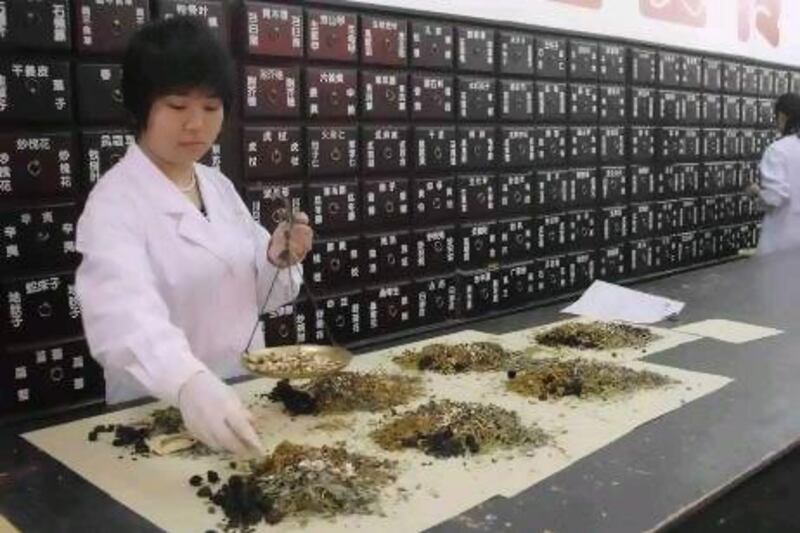BEIJING // Dried caterpillars, deer antlers, sea cucumbers and even human placenta are some of the more unusual ingredients still commonly used in traditional Chinese medicine.
East Asia may have hurtled headlong into the modern era but offbeat beliefs in the medicinal benefits of various, often exotic, substances persist - sometimes to an extent that alarms the authorities.
Last week's announcement that South Korean customs had seized 17,000 pills made from human flesh offered dark echoes of cannibalism, a practice more suited to the South Pacific in the early 19th century than to some of Asia's most developed regions.
South Korean officials said that in the past year, they uncovered 35 attempts to smuggle in the pills, thought to have been made in north-east China from stillborn babies or aborted foetuses.
While China's ministry of health insists it has no evidence that powdered baby flesh is being used in pills, some people cling to the belief that such ingredients can improve sexual performance or ward off disease, even if experts ridicule the suggestions.
Given the pills' illicit status, it is perhaps no surprise that visits to traditional Chinese medicine pharmacies in Beijing did not unearth any human flesh pills.
The idea of such pills is "appalling", said one pharmacist at the Beijing branch of the Yong An Tang pharmacy chain.
Yet many of the more unusual ingredients in traditional Chinese medicines are freely available in the capital's pharmacies.
The Tong Ren Tang pharmacy is the world's largest producer of traditional Chinese medicine, with 1,500 branches in China and 56 overseas. As well as ginseng, a Chinese traditional medicine favourite, one packet of pills on sale there contains such delights as deer antler and chicken blood.
Costing 136 yuan (Dh79) for two days' supply, the pills are said to aid women who are "extremely weak" after giving birth.
And pills made from sheep's liver are noteworthy for their supposed ability to cure two wildly unrelated conditions - fatigue and bad breath.
To the uninitiated, the myriad pills on sale could contain anything. Perhaps of greatest curiosity, then, are the many ingredients that are sold close to their natural state - although often, they are not for the squeamish.
There are dried caterpillars that are said to provide benefits for the lungs and kidneys when the water they have been soaked in is drunk at night. A box containing 18 sells for 1,300 yuan (Dh757).
Sea cucumbers, popular in restaurants, are also available dried at pharmacies - but only for those with a bank balance that matches their enthusiasm for traditional remedies.
The prices vary according to the grade, but one 450 gram box of prime sea cucumbers comes in at 14,480 yuan (Dh8,427).
"These are really good for pregnant women because they help her unborn child develop intelligence and they help people recover if they have had an operation or something like that," said an assistant at Beijing's Wangfujing pharmaceutical store, who did not give her name.
She said the sea cucumbers should be soaked and, once they have grown to two or three times their dry size, cut up and eaten piece by piece over a number of days. She recommended dipping them in soybean sauce or serving in a bowl of rice porridge.
Sea cucumbers, slug-like animals, are surely not to everyone's taste, but they are certainly more appealing than another traditional Chinese medicine speciality - human afterbirth.
Yes, while human flesh pills might be scarce or nonexistent in Beijing, bits of dried placenta can be tracked down without too much difficulty.
At the Beijing Yong An Tang pharmacy, a handful of pieces of human placenta, weighed on a set of hand-held scales, costs 22 yuan (Dh13).
They smell of dried blood, are coloured brown and black and have what appear to be blood vessels clearly visible on their rough surfaces.
They are said to be effective at curing impotence in men, male and female infertility and some kidney and lung conditions.
The best way to take them, according to the pharmacist, is to boil them in water and drink the liquid that is produced.
"It's a common medicine but you cannot get it very easily nowadays because a lot of women want to keep [the placenta] themselves or they feel it's their body part so they don't want to sell it to the hospital," she said.






